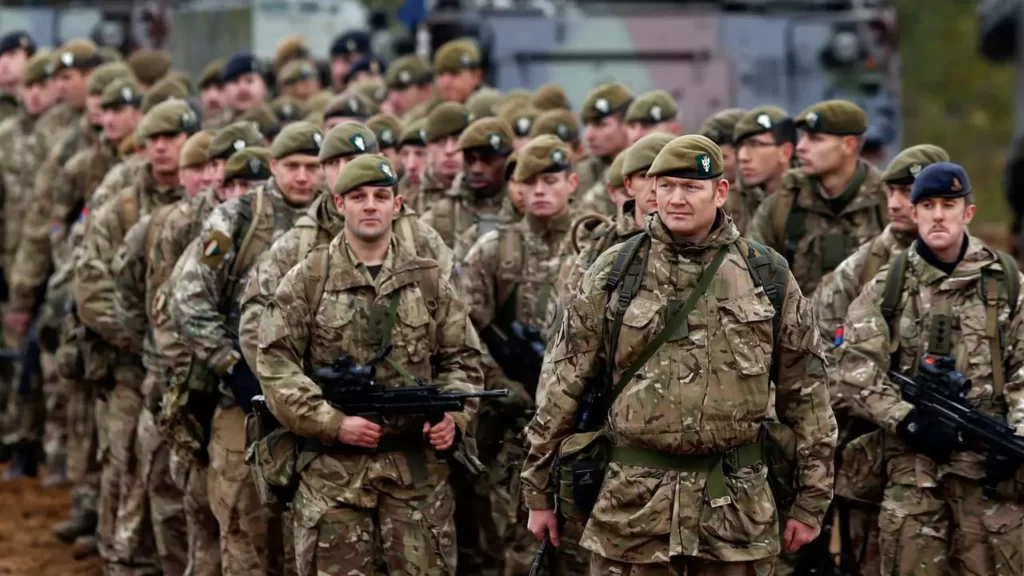As it is widely known, the United Kingdom will undergo early elections on July 4th due to Prime Minister Rishi Sunak’s decision, amid strong political pressures for him to resign given the country’s poor economic situation. In the midst of the campaign, with the Labour Party led by Keir Starmer widely favored in the polls, the Conservative Party, currently in power, has proposed the return of mandatory military service for 18-year-olds in the country to strengthen the British Armed Forces.

With the influence of the conflict in Ukraine being evident, PM Sunak’s proposal presents two paths to involve young people in national defense: voluntary community service and the more traditional enlistment in the Armed Forces. In both cases, individuals would be required to serve for a period of one year, either one weekend per month in the former case or full-time in the latter. In broad terms, the British government aims to increase the ranks of the armed forces by a total of around 30,000 personnel.
Referring to the matter, the British Prime Minister stated: “Britain faces a future that is more dangerous and more divided today. There is no doubt that our democratic values are under threat. That is why we will introduce a new and bold model of national service for 18-year-olds.”

Regarding the funding required for such a task, the current leader mentioned new measures against tax evasion to strengthen state coffers, in addition to diverting funds from the UK’s Shared Prosperity Fund, originally intended to address economic inequality in different regions of the country.
This has sparked strong criticism from the Labour Party, which has lowering the voting age as one of its main proposals for young people, knowing that it would favor their future electoral numbers. In the words of the current Labour mayor of Manchester: “The national service we need from our young people is to vote for change on July 4th.”

A trend that has been apparent for years in the United Kingdom…
Readers familiar with news about the British Armed Forces will not be surprised by the following statement: The UK is recruiting fewer cadets to replace departures and is approaching a critical situation in sustaining its status as a medium power. This is a trend that is not insignificant at all; in concrete numbers, just last year, 7,000 personnel left their duties in the various forces, representing a 4% reduction in total terms. At the same time, the number of new recruits decreases year by year, reflected in an 8 percentage point drop comparing 2023 to 2022.

Among the reasons cited by personnel leaving the forces are a wide range of issues, from significant issues such as military housing in a dilapidated state (with which half of the troops are completely dissatisfied according to surveys) and low salaries, to demands from recruits to be allowed to wear beards while on duty.
In the words of retired military officer Richard Foord, who currently serves as defense spokesperson for the Liberal Democrats: “Grant Shapps must realize that addressing the challenge of recruitment and retention will require much more than worrying about beard policies. It requires proper investment in our brilliant armed forces personnel (…) The Secretary of Defense needs to work to retain our best service personnel, providing them with decent accommodation and ensuring fair treatment for service personnel, as well as their families.”

How does this issue impact in concrete terms? The most illustrative example is found in the Royal Navy. In January of this year, two Type 23 frigates (HMS Westminster and HMS Argyll) were decommissioned precisely due to the aforementioned issue. Both vessels had recently undergone maintenance work as part of what is known as the Post-life Extension Program (LIFEX), which involved a thorough review of the hull and the integration of new technological capabilities. However, with the new Type 26 frigates nearing service, the crews of the aforementioned Type 23s were relocated to fill the gaps. The consideration of the early retirement of the amphibious landing ships HMS Bulwark and HMS Albion to free up personnel is another clear example of this.
…and also in much of Europe
Fears related to an escalation of conflict with Russia have led several major countries in the Old Continent to reevaluate their defense forces, with the current low number of available personnel and the also low number of new recruits being a central issue. At Zona Militar, some of these cases have already been studied, with particular interest in Germany’s case; however, similar problems are found in Spain, France, and Portugal.

This is a nation that, although not in the midst of an election campaign, is outlining three different proposals to reintroduce mandatory military service for those over 18 years old. The goal is similar to that of the UK: to bolster the ranks of the Bundeswehr by about 20,000 men and women to bring the total number of personnel to 200,000. Faced with recruitment problems, German Defense Minister Boris Pistorius declared during a visit to Washington: “I am convinced that Germany needs a form of mandatory military service.”
It will also be interesting to see that while the ruling parties seek different ways to introduce some form of mandatory military service, there is always resistance from the political spectrum; particularly from the left. In the German case, both the Green Party and the Free Democrats have already expressed opposition to the measure despite having cooperated on various initiatives with the government, even though it is not yet fully defined.
*Images used for illustrative purposes.
You may also like: The United Kingdom has yet to find buyers for the retired C-130J Super Hercules aircraft from the Royal Air Force












